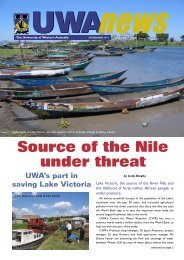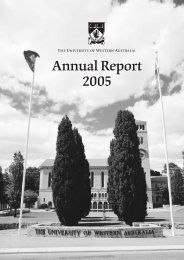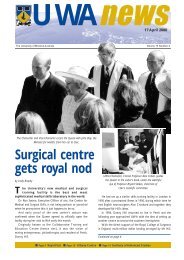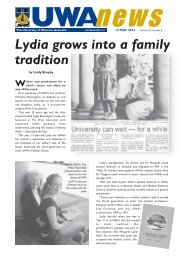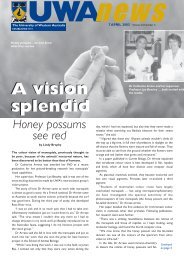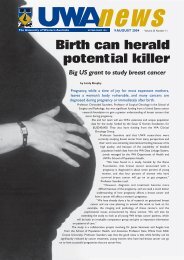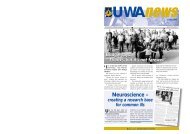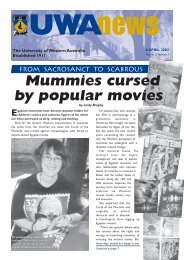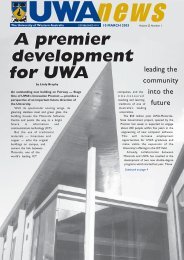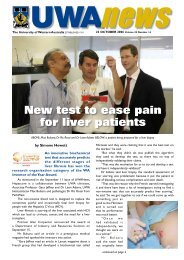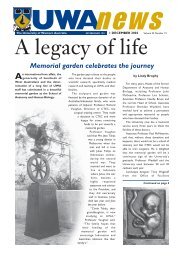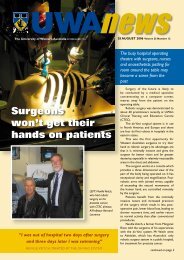July 24, 2000 - Publications Unit - The University of Western Australia
July 24, 2000 - Publications Unit - The University of Western Australia
July 24, 2000 - Publications Unit - The University of Western Australia
You also want an ePaper? Increase the reach of your titles
YUMPU automatically turns print PDFs into web optimized ePapers that Google loves.
12 UWA newsDepartment <strong>of</strong> PathologyGolf aidsbreast cancerresearchBev Jackson is a woman <strong>of</strong> unlimited enthusiasm.As a member <strong>of</strong> the Zonta International Peel Club,she is the driving force behind a unique campaign inwhich funds for breast cancer research are raisedthrough golf tournaments. By cajoling, harassing, andbrowbeating businesses, corporations, pr<strong>of</strong>essionalgolfers and individuals, Bev almost single-handedlypersuades them to support Zonta’s annual fund-raiser —a nine-hole mixed tournament at the Pinjarra Golf Club.This year, after the ninth-hole had been completed inthe tournament in February, money was raised throughan auction <strong>of</strong> donated goods and services, ably conductedby Arthur Marshall, MLA for Dawesville.To date, the group has raised more than $32,000 fromthis annual event, and the money has enabled theDepartment <strong>of</strong> Pathology to buy vital items <strong>of</strong> equipmentincluding their newest acquisition — a researchmicroscope.To acknowledge Zonta’s generous contributions toresearch into breast cancer, the department recentlyheld a special ceremony at which Club President JoyceO’Loughin was presented with a mounted cover <strong>of</strong> theJournal <strong>of</strong> Cell Biology, which features an article by researchstaff using image analysis equipment bought by thedepartment with money raised by Zonta.Bev Jackson using the new research microscope.Centre for Women and BusinessNew focusforresearchingwomenin businessWhile women in business and the pr<strong>of</strong>essionshave made real advances over recentdecades, they still lag behind men in achievingdecision-making positions, resulting in many leavingthe corporate arena to run their own businesses.To provide a focus for research aimed at giving smallbusiness and the corporate world a better understanding <strong>of</strong>the issues involved, the Centre for Women and Business hasbeen established as part <strong>of</strong> the Graduate School <strong>of</strong>Management.For Centre Director Pr<strong>of</strong>essor Leonie Still, the priority isto promote public debate about issues relating to women inwork, and the barriers preventing them from achieving theirfull potential.<strong>The</strong> trend towards running their own businesses is notnecessarily an adverse one but it does have limitations, saysPr<strong>of</strong>essor Still. “Thirty-five per cent <strong>of</strong> small operators arenow women and the rate is accelerating. Many are escapeesfrom the corporate world, tired <strong>of</strong> not achieving theirambitions, and <strong>of</strong> conforming to a masculine culture.<strong>The</strong>y want to do things differently — to combine socialand economic goals, value honesty and integrity, look aftercustomers, and make a contribution to the community.(Many men have the same goals, but perhaps not to thesame degree.)Most women keep their businesses small, working ontheir own or with a few employees, in order to keepcontrol and avoid being bought out by a partner. Onelimitation is that they tend not to grow their businesses;instead they start another small enterprise, and thus becomeserial business owners. “<strong>The</strong>y do it quite successfully,” saysPr<strong>of</strong>essor Still “<strong>The</strong> limitations, if you use the male model,are that we are not producing women who will build multinationals,they don’t want to reach for the sky as men do.”Women are also limited in the types <strong>of</strong> business they run,tending to focus on the service area, as opposed tomanufacturing, which needs venture capital.“What is very pleasing,” says Pr<strong>of</strong>essor Still, “is thatyoung women don’t have these limitations. <strong>The</strong>ir approachis, ‘I can do anything’. <strong>The</strong>y invest in themselves and theirown entrepreneurial abilities, and they are proving they canattract venture capital.”TOP PHOTO: Catherine Ferrari (left), new CEO <strong>of</strong> theWA Symphony Orchestra, with Kate Lamont,winemaker and restauranteur.THE UNIVERSITY OF WESTERN AUSTRALIA • JULY <strong>24</strong> <strong>2000</strong>



